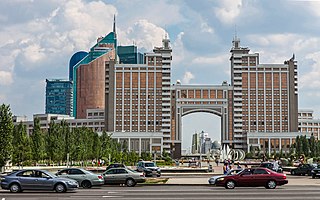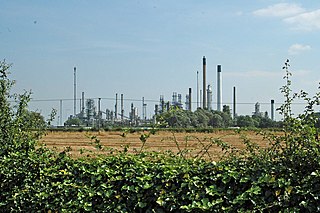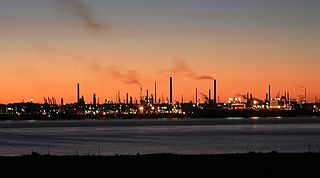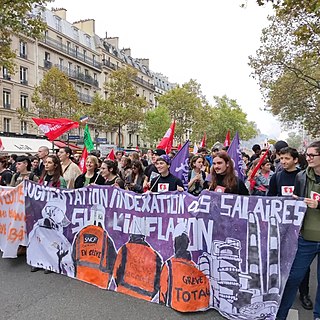The Grunwick dispute was a British industrial dispute involving trade union recognition at the Grunwick Film Processing Laboratories in Chapter Road, Dollis Hill in the London suburb of Willesden, that led to a two-year strike between 1976 and 1978.

Aberthaw Power Station refers to two decommissioned coal-fired and co-fired biomass power stations on the coast of South Wales, near Barry in the Vale of Glamorgan. They were located at Limpert Bay, near the villages of Gileston and West Aberthaw. The most recent power station on the site, Aberthaw B Power Station, co-fired biomass and as of 2008 had a generating capacity of 1,560 megawatts (MW). The power station closed on 31 March 2020.

KazMunayGas (KMG) (Kazakh: QazMūnaiGaz, ҚазМұнайГаз) is the state-owned oil and gas company of Kazakhstan. It was founded in 2002 by merging CJSC Kazakhoil and CJSC Oil&Gas Transportation.

The Humber Refinery is a British oil refinery in South Killingholme, North Lincolnshire. It is situated south of the railway line next to the A160; Prax Group's Lindsey Oil Refinery is north of the railway line.
The 1993 DundeeTimex strike was a major industrial dispute which took place in Dundee, Scotland, in 1993. The dispute, which was notable for its level of picket-line violence and the involvement of women, ended with the closure of the Timex plant in the city after 47 years. It is considered by historians to be the last of the large industrial disputes of late 20th century Britain.
Prax Lindsey Oil Refinery is an oil refinery in North Killingholme, North Lincolnshire, England owned and operated by the Prax Group. It lies to the north of the Humber Refinery, owned by rival oil company Phillips 66, and the railway line to Immingham Docks. Immingham Power Station, owned by VPI Immingham, provides the electricity and heat for the fractionation processes.
Occupation of factories is a method of the workers' movement used to prevent lock outs. They may sometimes lead to "recovered factories", in which the workers self-manage the factories.

Fawley Refinery is an oil refinery located at Fawley, Hampshire, England. The refinery is owned by Esso Petroleum Company Limited, a subsidiary of Exxon Mobil Corporation, which acquired the site in 1925. Situated on Southampton Water, it was rebuilt and extended in 1951 and is now the largest oil refinery in the United Kingdom, and one of the most complex refineries in Europe. With a capacity of 270,000 barrels (43,000 m3) per day, Fawley provides 20 per cent of the UK's refinery capacity. Over 2,500 people are employed at the site.

Grangemouth Refinery is an oil refinery complex located on the Firth of Forth in Grangemouth, Scotland, currently operated by Petroineos. It is the only operating crude oil refinery in Scotland and currently one of the six remaining refineries in the UK. Grangemouth is the oldest refinery in the UK and supplies 65% of Scotland's oil products, including petrol and diesel.
IREM S.p.A. is an Italian construction contracting global company. It was founded in 1979 by a group of professionals with experience in the mechanical construction business. Giovanni Musso is the Managing director of IREM S.p.A.
The Posted Workers Directive96/71/EC is an EU directive concerned with the free movement of workers within the European Union. It makes an exception to the Convention on the Law Applicable to Contractual Obligations 1980, which ordinarily requires that workers are protected by the law of the member state in which they work.

The 2009 Royal Mail industrial disputes is an industrial dispute in the United Kingdom involving Royal Mail and members of the Communication Workers Union (CWU), which began in the summer of 2009. It was the country's first industrial action involving postal workers since 2007 and came about after the Communication Workers Union accused Royal Mail of refusing to enter into dialogue regarding how the implementation of modernisation plans would affect the job security of postal workers.
Events from 2009 in England
The 2021 St. Paul Park refinery strike was a labor dispute in St. Paul Park, Minnesota, United States. The strike, involving approximately 200 workers, took place at an oil refinery owned by Marathon Petroleum and began on January 21, 2021, with members of Local 120 of the International Brotherhood of Teamsters alleging unfair labor practices and unsafe working conditions. According to union representatives, the strike was originally intended to last for one day, but that the company performed a lockout on the workers. While the company denies that the dispute is a lockout, multiple sources, including the Star Tribune and the news agency Reuters, describe the dispute as a lockout.
The 2021 British Gas strike was a labour strike by British Gas workers in the United Kingdom. The workers, represented by the GMB union, opposed British Gas' "fire and rehire" plans, where the company planned mass layoffs of employees, with the goal of ultimately rehiring them on less favourable contracts without having to negotiate over terms.

The 2021–2023 Stagecoach strikes were a series of labour strikes by Stagecoach Group bus drivers, cleaners and engineers across the United Kingdom, the first of which began in 2021. Represented by Unite the Union, the National Union of Rail, Maritime and Transport Workers (RMT) or the GMB, workers in over 20 different areas were involved in labour disputes with Stagecoach, with strikes being called in several of those areas.
The 2022–2024 United Kingdom railway strikes were an industrial dispute between rail workers and companies, with the latter supported by the UK government. The rail workers are represented by several unions including the National Union of Rail, Maritime and Transport Workers (RMT) and the Associated Society of Locomotive Engineers and Firemen (ASLEF). The railway strikes commenced on 21 June 2022 after workers walked out over wages, planned changes to working practices – involving the removal of guards from trains, the reduction in the number of open ticket offices, and an increase in the age at which people could claim the young persons and senior citizen card – and the threat of redundancies. The industrial action was the largest in the sector since 1989, and involved 40,000 workers nationwide.
Since May–June 2022, a series of labour strikes and industrial disputes have occurred in various industries of the United Kingdom's economy as workers walked out over pay and conditions. The strikes took place with rising inflation, and demands for pay increases that would keep pace with this inflation.

Thousands of people across France came to the streets in October 2022, launching a statewide strike against the rise in the cost of living. The demonstrations erupted following weeks of "walkouts" that have crippled oil refineries and caused gasoline shortages. The demonstrations have been described by Caroline Pailliez and Clotaire Achi of Reuters as the "stiffest challenge" for Emmanuel Macron since his re-election in May 2022.

Europe inflation protests are ongoing protests across Europe against the growing cost of living and inflation. The rise of prices has been attributed to the 2022 Russian invasion of Ukraine. The protests have been reported in France, Germany, Romania, and Czech Republic.








